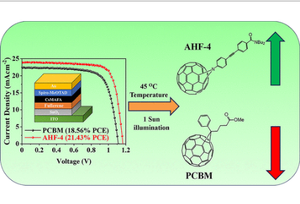Molecular Engineering of Azahomofullerene-based Electron Transporting Materials for Efficient and Stable Perovskite Solar Cells
Rohit D. Chavan, Bartłomiej Bończak, Joanna Kruszyńska, Apurba Mahapatra, Muhammad Ans, Jan Nawrocki, Kostiantyn Nikiforow, Pankaj Yadav, Jan Paczesny, Faranak Sadegh, Muhittin Unal, Seckin Akin, and Daniel Prochowicz
Chemistry of Materials 2023 35 (19), 8309-8320
DOI: 10.1021/acs.chemmater.3c01995
This study introduces a novel azahomofullerene (AHF-4) as an interlayer in perovskite solar cells (PSCs), enhancing charge transfer and film quality while reducing recombination. AHF-4 outperforms the standard fullerene derivative PCBM, achieving higher efficiency (21.43%) and better stability under light and heat, promising advancements in PSC performance and durability.
How Litos Lite and Litos were used
The photovoltaic performance was evaluated using a Fluxim Litos Lite setup, equipped with a Wavelabs Sinus LS2 solar simulator with AM 1.5 spectrum for excitation.
Aging tests were also performed using a Fluxim Litos setup, and 1 Sun equivalent illumination with no UV component, holding the substrates at 45 ± 5 °C in a N2 atmosphere and using an MPP tracking algorithm.

